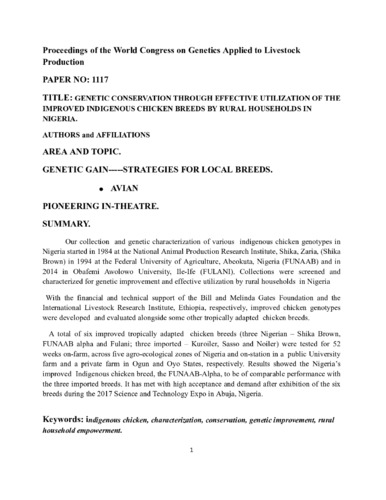Genetic conservation through effective utilization of the improved indigenous chicken breeds by rural households in Nigeria
Abstract
SUMMARY. Our collection and genetic characterization of various indigenous chicken genotypes in Nigeria started in 1984 at the National Animal Production Research Institute, Shika, Zaria, (Shika Brown) in 1994 at the Federal University of Agriculture, Abeokuta, Nigeria (FUNAAB) and in 2014 in Obafemi Awolowo University, Ile-Ife (FULANI). Collections were screened and characterized for genetic improvement and effective utilization by rural households in Nigeria With the financial and technical support of the Bill and Melinda Gates Foundation and the International Livestock Research Institute, Ethiopia, respectively, improved chicken genotypes were developed and evaluated alongside some other tropically adapted chicken breeds. A total of six improved tropically adapted chicken breeds (three Nigerian – Shika Brown, FUNAAB alpha and Fulani; three imported – Kuroiler, Sasso and Noiler) were tested for 52 weeks on-farm, across five agro-ecological zones of Nigeria and on-station in a public University farm and a private farm in Ogun and Oyo States, respectively. Results showed the Nigeria’s improved Indigenous chicken breed, the FUNAAB-Alpha, to be of comparable performance with the three imported breeds. It has met with high acceptance and demand after exhibition of the six breeds during the 2017 Science and Technology Expo in Abuja, Nigeria.

